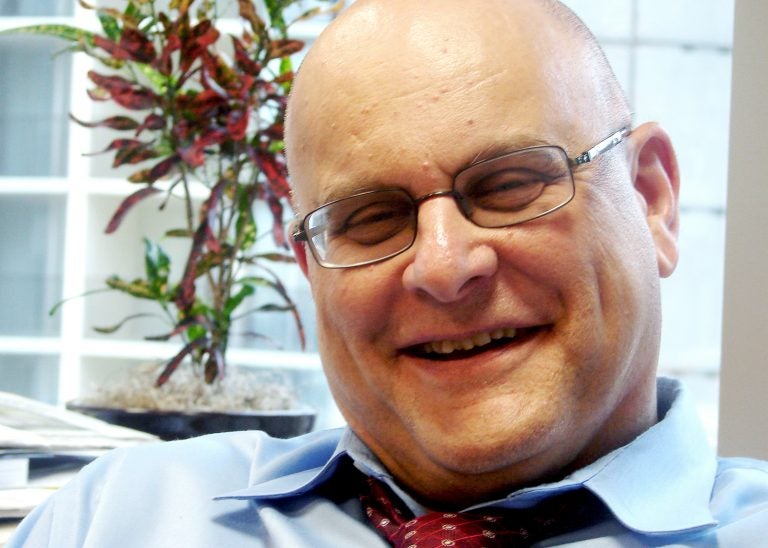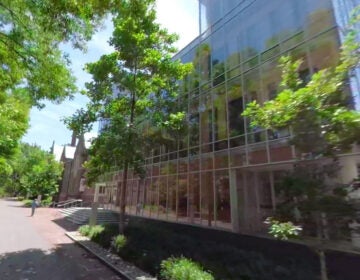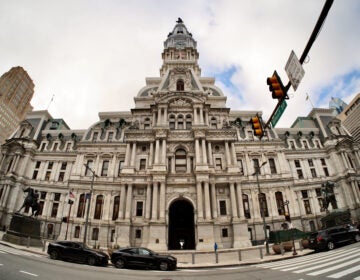An appreciation: Jeremy Nowak challenged assumptions about what was impossible
Jeremy Nowak lived to challenge dusty assumptions and the soft thinking that emerges from the comforts of ideology.

Jeremy Nowak (WHYY file)
This story originally appeared on PlanPhilly.
—
The irony was that people always assumed things about him.
Jeremy Nowak lived to challenge dusty assumptions and the soft thinking that emerges from the comforts of ideology. He was a thinker and a doer — it was, in fact, possible to do both.
People assumed it was impossible for a community organizer to create a bank that leveraged investments from the rich into loans for the poor, but that’s what Nowak did, starting with little more than a $10,000 grant and a vision for what would become the Reinvestment Fund. “It wasn’t that long ago that this whole model of community-development finance was more than unproven,” said Donald Hinkle-Brown, the Reinvestment Fund’s CEO. “It was a little more ambitious than what people thought was reasonable.”
Nowak saw a problem — the city’s poorest neighborhoods needed investment — and went about crafting a solution — getting conventional financial institutions to provide credit in those neighborhoods. Banks saw those investments as too risky — they were new businesses started by poor community entrepreneurs, or affordable-housing developments for which the only collateral was blighted land largely considered worthless. Nowak bridged the gap, convincing socially minded investors to shift their savings to the Reinvestment Fund, which plowed them into communities like North Camden.
By the time Hinkle-Brown took the Reinvestment Fund’s reins over from Nowak in 2011, the organization had grown to about $680 million in capital under management. Today, it has about $1 billion under management and makes about $200 million a year in loans to affordable-housing developers and community organizations.
“When people would ask me what it’s like to run this shop after Jeremy, I’d say that Jeremy built a great sports car, and I get to drive it,” said Hinkle-Brown. “He did all the hard, incredible, unprecedented work.”
“Jeremy didn’t just create the Reinvestment Fund. While he was creating the Reinvestment Fund, he created a whole new type of social enterprise, which became a model for many other institutions,” Hinkle-Brown added. “There is now a career [in community-development finance] in this world because of people like Jeremy.”
By training, not a financial guy
People assumed Nowak had a background in finance, especially once he assumed chairmanship of the Federal Reserve Bank of Philadelphia. But he studied philosophy at Pennsylvania State University and earned a Ph.D. in cultural anthropology from the New School in New York. He learned the ins-and-outs of lending on the ground.
“He had a Ph.D., but you wouldn’t know it,” said Larry Platt, co-founder of The Philadelphia Citizen, a news website Nowak chaired. “He didn’t put Ph.D. in his name — he wasn’t Dr. Nowak. That was one of the things I loved about him. He was always a Philly kid that grew up at Seventh and Girard.”
Like so many others who grew up in Philadelphia, Nowak was a diehard Philly sports fan and an eternal pessimist. As a non-resident senior fellow at the Brookings Institution, Nowak developed a reputation for trying to convert his think-tank colleagues into Eagles fans, but was known to make friendly wagers against the Birds.
Given his support for charter schools — during his short tenure at the William Penn Foundation, he helped foot the bill for a controversial study by the Boston Consulting Group that called for closing dozens of neighborhood schools and shifting upwards of 40 percent of the city’s schoolchildren into charters, and also gave $15 million to a newly formed charter cheerleader, the Philadelphia School Partnership — it was easy for some to assume that he was some kind of anti-government, libertarian crank. But he was the brains behind Mayor John Street’s Neighborhood Transformation Initiative, a $300 million moonshot to tackle blight that fell well short of its lofty goals.
“Implementation is policy,” Nowak would say afterward.
“That was a phrase of his,” Platt explained, “which is to say, you can be a visionary thinker but if you don’t implement that policy in a way that avoids the pitfalls we’ve seen [other] policies fall prey to, then you haven’t done anything good.”
Nowak had ambition on behalf of a city that often lacked it. At William Penn, he hoped to transform Philadelphia by focusing the $2 billion foundation’s efforts on just three areas: education, watershed protection, and the arts. He cut grants that lay outside those areas and backed politically charged charter schools.
The shy philanthropic giant found itself suddenly thrust into the spotlight. Nowak lasted just 17 months at the William Penn Foundation, a fact many attributed to his bullish push for change.
“He was never comfortable with the same,” said Hinkle-Brown. “Things had to change pretty dramatically, pretty fast. And that constant agitation for growth and change was who he was.”
Though some might assume such hard-charging would preclude introspection, Hinkle-Brown said that was not the case. “He never really wanted to act and not reflect — he always had to reflect on his actions.”
That bias toward action, followed by introspection, became a core tenant of the Reinvestment Fund, said Hinkle-Brown. It was one of the many ways that working for Nowak was both empowering and difficult.
“It was challenging to work for him, and it was stimulating to work for him and rewarding to work for him, all at the same time,” said Hinkle-Brown. “He was also one of the funniest people.”
“So, it’s such a weird combination: to be funny and intimidating and brilliant and all at the same time,” he added. “It was definitely a stimulus overload. And he was intense.”
“He was the biggest thinker I’ve ever spent any real amount of time with,” said Platt. “Everything was a big idea. Every idea was open to inspection.”
Nowak was an early supporter of The Philadelphia Citizen, a news website focused on solutions-based journalism and civic engagement, later penning a regular column.
“What he wanted [the Citizen] to be is, without allegiance to ideology, this arbiter of what works,” said Platt. “He wasn’t wedded to a preconceived notion or outcome. He was committed to following the data.”
“I remember him once saying, early on, the problem with newspapers is that, ‘I never read one and say to myself: What an interesting idea, where can I learn more about that?’” said Platt. “It’s all the predictable, same old back and forth. And yet he was living in this land of ideas that are much more vibrant and interesting.”
One might assume that someone who so actively sought out new concepts would reserve judgment, finding value in them all. But not Nowak, famed for decimating half-baked ideas with the Socratic method.
“He lived for debate,” said Platt. “The problem was, you never felt like you could win one.”
A believer in local governments’ power for change
Despite Nowak’s stumbles with the Neighborhood Transformation Initiative, his faith in the power of government to implement positive change remained unshaken, and formed the thesis of his recent book, co-written with Bruce Katz, “The New Localism: How Cities Can Thrive in the Age of Populism.”
The book was, in part, a response to Donald Trump’s election, which sickened Nowak, but it was arguably more an expression of his unwavering belief in pragmatism. Local governments, he wrote, could operate at a level below the ideological fray that made goal-oriented policy experimentation nearly impossible at the federal and state levels. Even with fewer resources, cities — at least those that ignored the traditional divides between the private and public sectors — could focus their resources efficiently enough to make headway on seemingly intractable problems.
Despite his disdain for Trump, Nowak spent some of his last weeks excited about a particular section of the president’s tax-cut bill: a $1.6 billion provision for “Opportunity Zones.” After all, how could he not be? The idea — to incentivize private capital investment in economically distressed parts of the country — was classic Nowak, leveraging capitalism’s means for a bleeding-heart liberal’s ends.
That the provision was sneaked into the massive bill by Sens. Tim Scott and Cory Booker — a bipartisan pair of former municipal government leaders — made it all the more perfect. Implementation is policy, of course, and that was where Nowak would come in: to consult mayors on how to best leverage an Opportunity Zone designation.
At least, that was the plan. “Man plans, God laughs,” Nowak liked to say.
He suffered a heart attack at age 66 on July 11, and passed away on July 28. A memorial service is planned at 10 a.m. Friday, Aug. 3, at Drexel University’s Main Building auditorium, 3141 Chestnut St.
WHYY is your source for fact-based, in-depth journalism and information. As a nonprofit organization, we rely on financial support from readers like you. Please give today.






